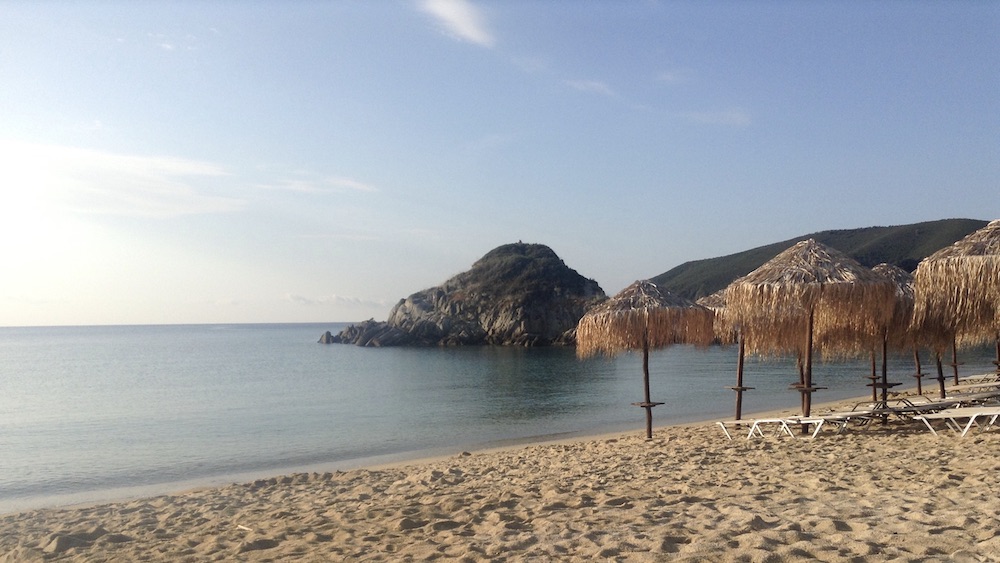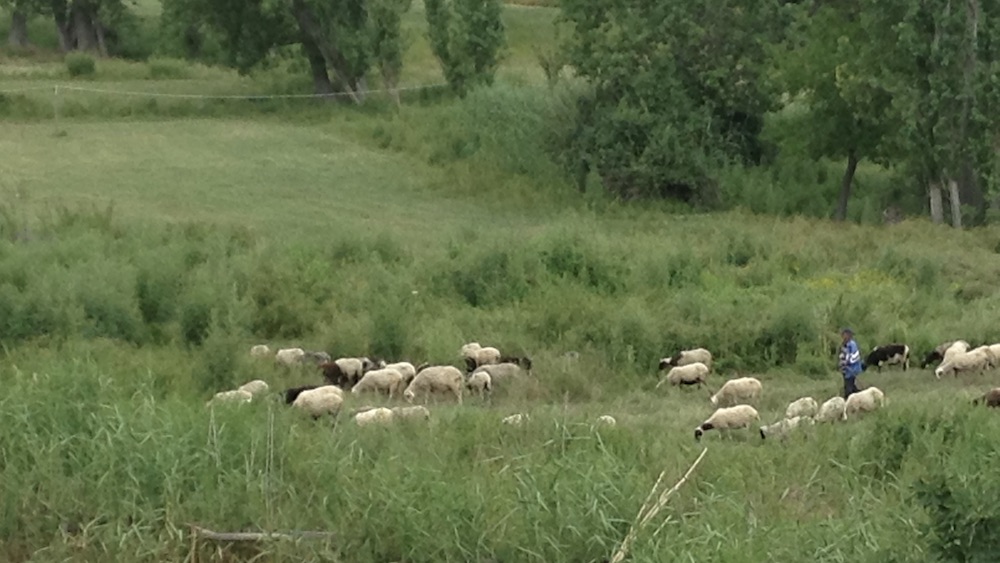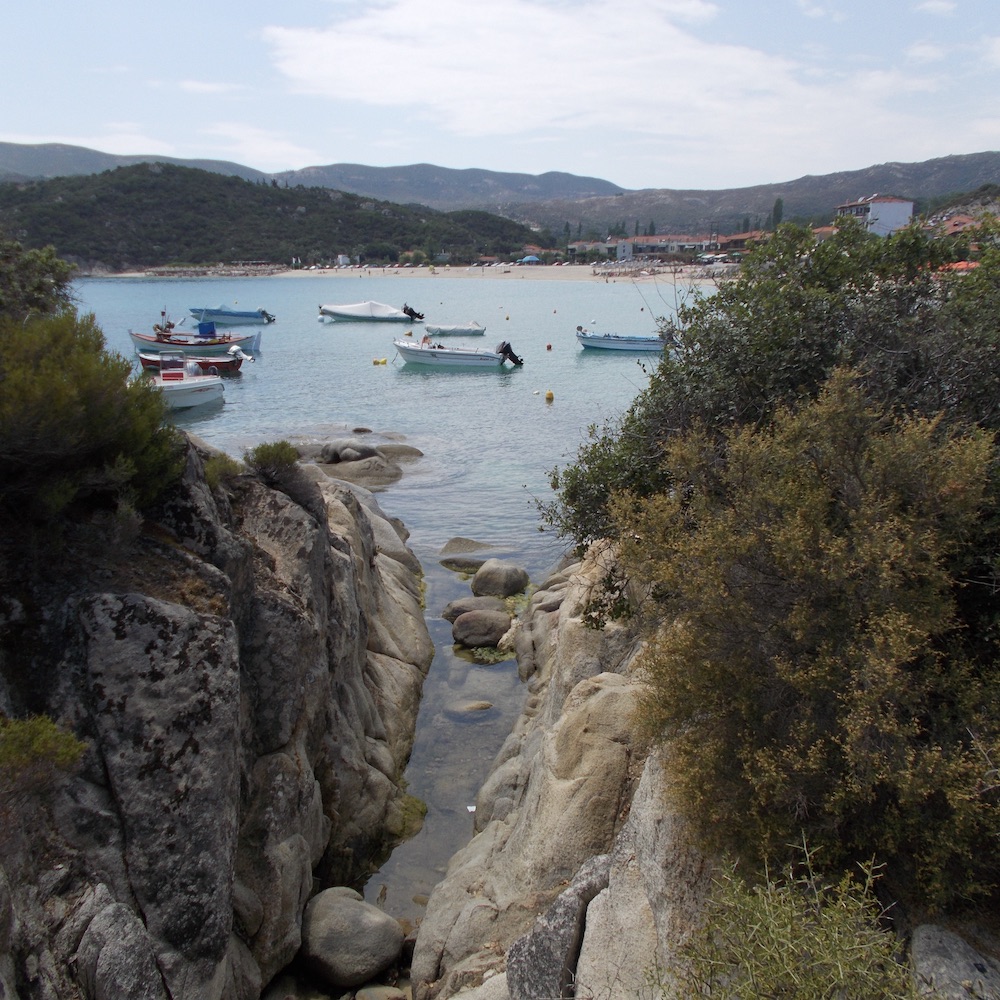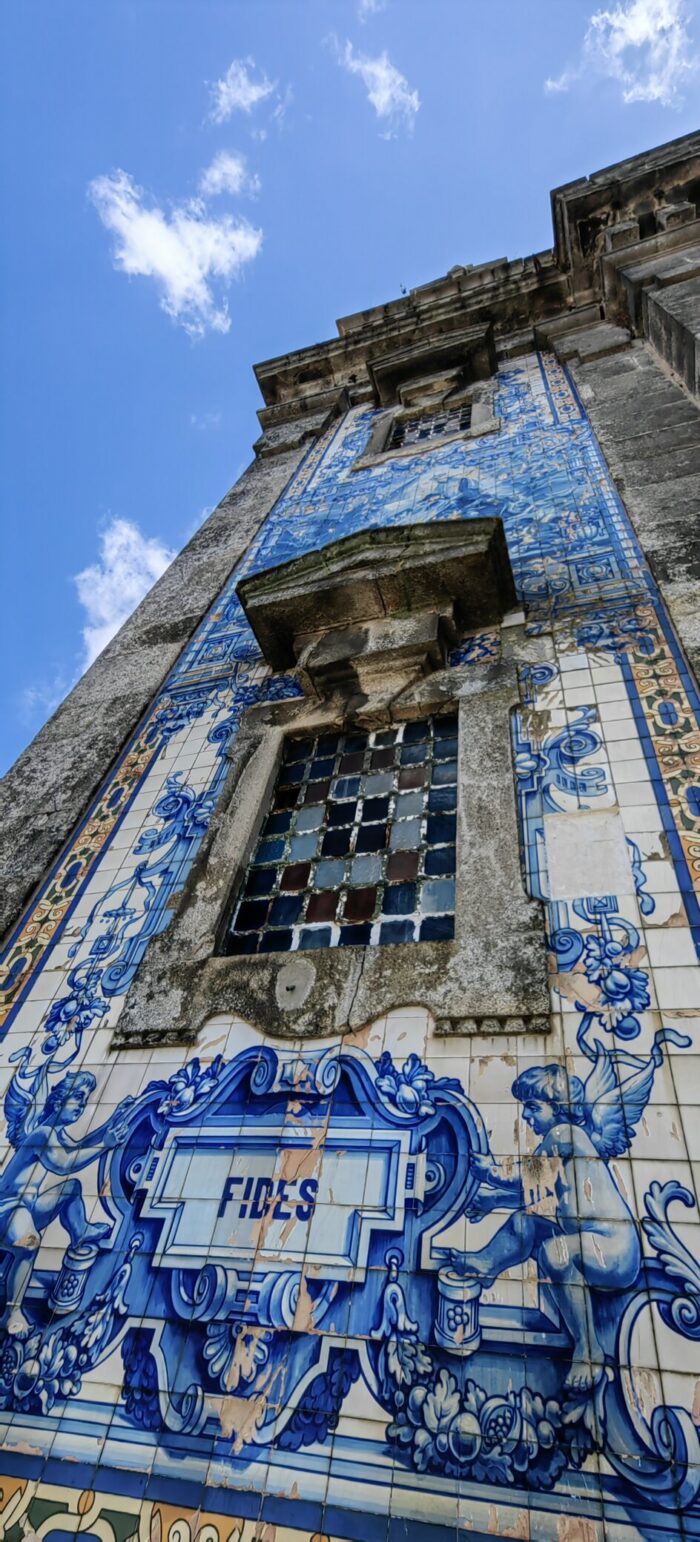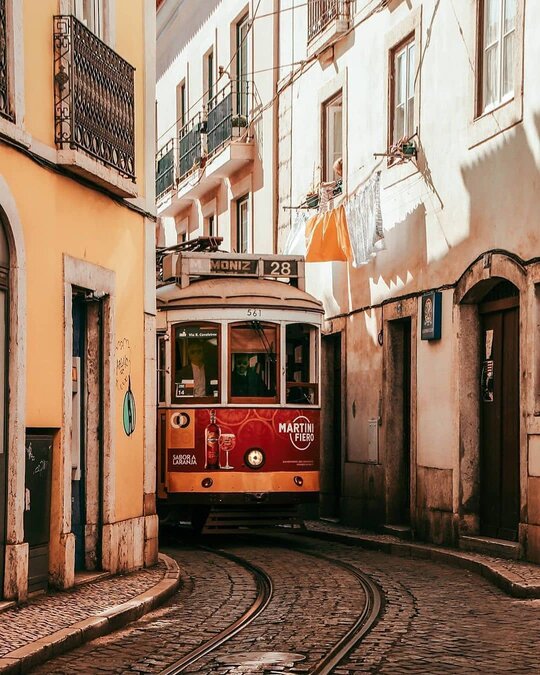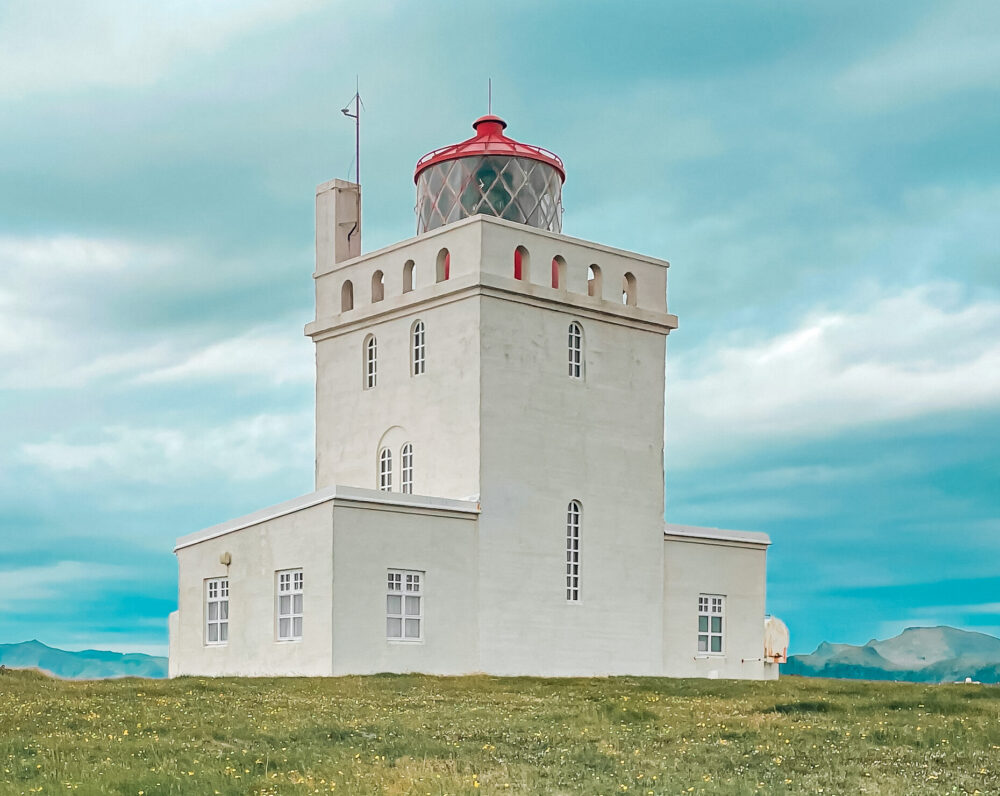We stepped off the bus at the bench with the dust-covered sunroof. Arid hills and gnarled olive trees painted the backdrop. The area looked forlorn and lost. I wondered if we were wrong to trust the woman on the train who recommended this as the best beach in Greece.
Granted, the hour had been late for those of us who drank cold beers in the tavern car of the overnight train. The conversations of the dozen travelers, who ranged in age from their twenties to our sixties, included a heartfelt discussion about connections to our homelands. I trusted those who traveled away from their home base, particularly those without set-in-stone plans. Traveling without an itinerary took a strong positive belief in one’s fellow human beings, sometimes courage, clearly self-assurance. As we emptied our glasses, we talked about the cords that connected us to home, to family—when in our lives they felt loose, when they could be severed, and when they required strength for security.
We asked which beach in Greece was the best just before we headed back to our own train car. “Kalamitsi!” responded the woman who talked at length about her Greek upbringing. Her answer set our plans, limited, as we preferred them, for the next three weeks.
The bus was moving out of our sight as we walked the worn road on the Helikides Peninsula. Grazing lands encircled us until we turned the bend; and the beauty of Kalamitsi Beach greeted us—its signature rock protecting the surrounding bay. We knew the woman on the train was right.
In Kalamitsi, we woke every morning to the bells on the sheep as they headed out to pasture. Every evening, the shepherd returned them to their enclosure and the clang-clanging brought a comfortable closure to the day. The event’s consistency and origin that started years before our arrival connected us to the place in a time-worn way.
We developed our own routine—breakfast, a quick ride on the public bus to another small village, and two trips daily to the seashore.
I swam the length of the bay every afternoon while my partner snorkeled. We met back at our towels, read books, and took in the last rays of the sun. We held no real schedule, no necessary objectives. It was simply a vacation from our normal routines of teaching and writing.
Within the first week, I noticed a vendor who leaned his two-by-three-foot display board against a white plastic chair. He sat on the sand, avoiding the sun with his umbrella sized for two. No one came to see the dozens of sunglasses he pinned to one side of the board or the hundreds of beads and necklaces draped on the other while I watched that afternoon. The seller broke his own solitude by making one short mobile call. Was he calling for more merchandise? Arranging a ride? Maybe setting a date for after work.
Unlike the sunbathers, he wore a long-sleeved striped dress shirt and pants that hung well past the tops of his Vans shoes. He had on shades, like the ones he was hawking. And he was very dark-skinned. He didn’t look Greek, but he didn’t appear to be Central African like the guys selling purses in the nearest city, Thessaloniki.
As late afternoon arrived, the pensioners and families with young children surrendered the beach. The older German couple, who set up chairs early in the morning, picked up the cooler now void of cold drinks and lunch. The family of four from the Balkans, with the two buck-naked little boys, searched for their sand shovels and mini dump trucks and tossed them into their big blue bucket. They all headed to nearby motels or cabins to finish out the rest of the evening. Young couples just waking from afternoon naps in their rooms appeared and ordered a round of drinks to mark the beginning of another night of drinking.
When this changing of the guard began, the vendor, like a crab coming out from under his rock, left the protection of his umbrella. He picked up his display board and walked to the closest end of the beach to the nearest gathering. He pummeled the board and shook a gourd with necklaces attached to it to get attention. One or two people showed interest with a word and a nod of the head. He cleaned off a selected pair of glasses with a small cloth and pulled a mirror from his back pocket to let the buyer see her reflection.
Fish on! The woman smiled at the shades with the white frames, but then shook her head. She handed back the glasses. He flipped over the board and showed the less expensive objects—hand-strung necklaces and bracelets made of wood, glass, rock. He had many, all sorted by shape or color, hanging like clusters of grapes, ready to be picked. She shook her head again and looked away, a successful way to dismiss the vendor.
The water was clear and blue; the sand white and smooth. This small bay offered only a few hotels and cafes. It attracted middle-class people from the land-locked areas of Eastern Europe, spending their holiday week camping, renting small apartments, or splurging on relatively low-cost hotel rooms, often with cooking facilities. Visit Greece! Warm! Easy to get to! Priced right! Greece offered families and couples an opportunity to leave their comfortable homes and expand their horizons in an agreeable, and not-too-challenging, manner. Eastern Europeans drove south, their cars filled with familiar foods to cook, to remind them of home, and ensure their cord stayed connected.
The two mini markets in Kalamitsi sold a variety of fresh fruits and vegetables and an aisle of beach essentials—sandals, cheap skin-diving equipment, and sun lotion. Few offered personal adornments such as sunglasses or low-end, handmade jewelry, making the vendor’s wares a good choice.
The salesman on the beach approached me with the sunglass side of the board. I pointed to the pair on top of my head. He flipped the board and I waved the beads away. I focused on him, not much older than my 20-year-old son, and asked, “Are you Greek?”
He stopped. He processed my words and then in a high-pitched voice answered, “Bangladesh, Bangladesh!” I tried to engage him, but he walked to his next potential customer.
He solicited every beach sitter. Dogmatic, he traversed the sands from one end to the next, working his way down the beach. His interaction occasionally changed as a result of someone’s specific comment: “Show me all your yellow sunglasses,” or “I like glass beads, only glass. Are these glass? I like these even if they aren’t glass.”
I didn’t see him sell anything during the 90 minutes he worked the customers. Odd. Few people wore sunglasses and no one wore any jewelry like he sold. I wondered what stopped the tourists from buying something from this man. Dark glasses would have been helpful on those bright days. Were they over-priced? Was the Greek equivalent of Target or Wal-Mart the only reputable place to purchase such goods? Was this the time for sunning and swimming and the time for buying came later? I had no answers. And answers were important to me.
Traveling as an American tourist, I had difficulties with language, money, and transportation. I could only imagine what this man encountered, compounded by his different appearance, possible immigration status, and, perhaps, his impact on local Greeks as he competed for tourist dollars at the height of the global recession.
We humans seek comfort. We have a hierarchy of needs that starts with survival and then includes security, safety, and relationships. At what price did he give up those?
The vendor reached the end of the beach, his selling opportunities complete. On the return to his chair and umbrella, I intercepted him and asked, “Can I talk with you?”
“Bangladesh, Bangladesh!” he responded without hearing my question.
“Do you speak English?”
He stopped and focused. “Yes, some,” he answered. I followed him to his umbrella. His shoes deeply imprinted the coarse sand with each step. He leaned his selling board against the chair and flopped down into the shade. I asked his name and about Bangladesh.
Sammy kept in touch by phone with his parents, wife, and two children. There were no jobs back home; he came to Greece traveling through India and the Middle East. Greece had tourists, so others from Bangladesh took the same path. Sammy shared a car with them, driving and selling from one tourist resort to another on the peninsula.
He had tested the cord that tied him to his home. I asked him if it was hard to be separated from his family. Sammy’s dark eyes looked intently from under his straight, black bangs. “Yes,” he said softly.
I heard his answer and listened to all it implied. A long moment passed and I congratulated him on his efforts, thanked him for talking with me, and offered him a five Euro note for his time.
Instead of pocketing the money, he combed the board behind him to find just the right necklace and gave me one made of purple glass. I put it over my head and let it hang from my neck. Sammy left the umbrella and chair on the beach for a future day of selling. He exited the parking lot, waving as he passed me from a small, older car.
I walked across the lot. Small stones dug into my bare feet. I sat on a wooden bench, shook out my sandals, and bent over to brush my sand-caked feet.
The cord of the purple glass necklace caught a button on the side of my pants. Strong, it did not break, but I did. I cried.
It was one thing to be on a train, experiencing new parts of the world with your friends or partner, and quite another to be separated from your loved ones to ensure their survival. I sat for a few minutes, thinking. It was crazy to cry while I was on the best beach in Greece. My tears slowed and stopped.
I headed back to our room to listen to the bells of the sheep and make a call to my son, my family. I needed, then, to re-strengthen my own connection to home.
Get more like this—Sign up for our daily inspirational newsletter for exclusive content!
__
Photo: J.O. Haselhoef

